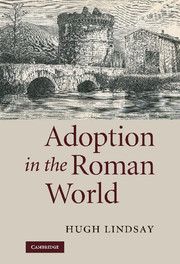Book contents
- Frontmatter
- Contents
- List of figures
- Preface
- List of abbreviations
- Introduction
- 1 Adoption, kinship and the family: cross-cultural perspectives
- 2 Kinship in Greece and Rome
- 3 Greek adoptions: comparisons and possible influences on the Roman world
- 4 Procedural aspects of Roman adoption
- 5 The testamentary adoption
- 6 Roman nomenclature after adoption
- 7 Adoption and inheritance
- 8 Roman freedmen and their families: the use of adoption
- 9 Adoption in Plautus and Terence
- 10 Sallust and the adoption of Jugurtha
- 11 Adrogatio and adoptio from Republic to Empire
- 12 Testamentary adoptions – a review of some known cases
- 13 Political adoptions in the Republic
- 14 Clodius and his adoption
- 15 The adoption of Octavian
- 16 Political adoption in the early Empire at Rome, Pompeii and Ostia; the imperial family
- Conclusion
- Glossary
- References
- Index
9 - Adoption in Plautus and Terence
Published online by Cambridge University Press: 25 January 2010
- Frontmatter
- Contents
- List of figures
- Preface
- List of abbreviations
- Introduction
- 1 Adoption, kinship and the family: cross-cultural perspectives
- 2 Kinship in Greece and Rome
- 3 Greek adoptions: comparisons and possible influences on the Roman world
- 4 Procedural aspects of Roman adoption
- 5 The testamentary adoption
- 6 Roman nomenclature after adoption
- 7 Adoption and inheritance
- 8 Roman freedmen and their families: the use of adoption
- 9 Adoption in Plautus and Terence
- 10 Sallust and the adoption of Jugurtha
- 11 Adrogatio and adoptio from Republic to Empire
- 12 Testamentary adoptions – a review of some known cases
- 13 Political adoptions in the Republic
- 14 Clodius and his adoption
- 15 The adoption of Octavian
- 16 Political adoption in the early Empire at Rome, Pompeii and Ostia; the imperial family
- Conclusion
- Glossary
- References
- Index
Summary
In the early second century bc Plautus and Terence both use domestic situations as the basis for their plays, which are acknowledged to be heavily influenced by Greek models but to some extent modified to suit Roman audiences. There is still dispute over the detail. Cases of adoption mentioned by Plautus have generally been thought to reflect Greek rather than Roman customs. There are three relevant passages reviewed by Paoli (Paoli [1963] 548–51). The first is in Menaechmi:
He had no children except his wealth.
He adopts that kidnapped boy as his son
and gave him a dowered wife,
and made him his heir on the day he died.
Here an Epidamnian trader has kidnapped one of the brothers Menaechmi at Tarentum, where he had been taken on a business trip by his real father. The trader carried him off home to Epidamnus and treated him like a son. The process is described as an adoption, although under the circumstances there can have been no official procedure, no granting of patria potestas, such as would occur under a Roman adoption. The author reflects ideas about adoption in the Greek rather than the Roman world. Even so, the whole case is highly irregular, since the status of the child is the result of fraud. The trader might nevertheless have passed off the child as his own in his phratry. None of this is revealed in the play.
- Type
- Chapter
- Information
- Adoption in the Roman World , pp. 138 - 143Publisher: Cambridge University PressPrint publication year: 2009



